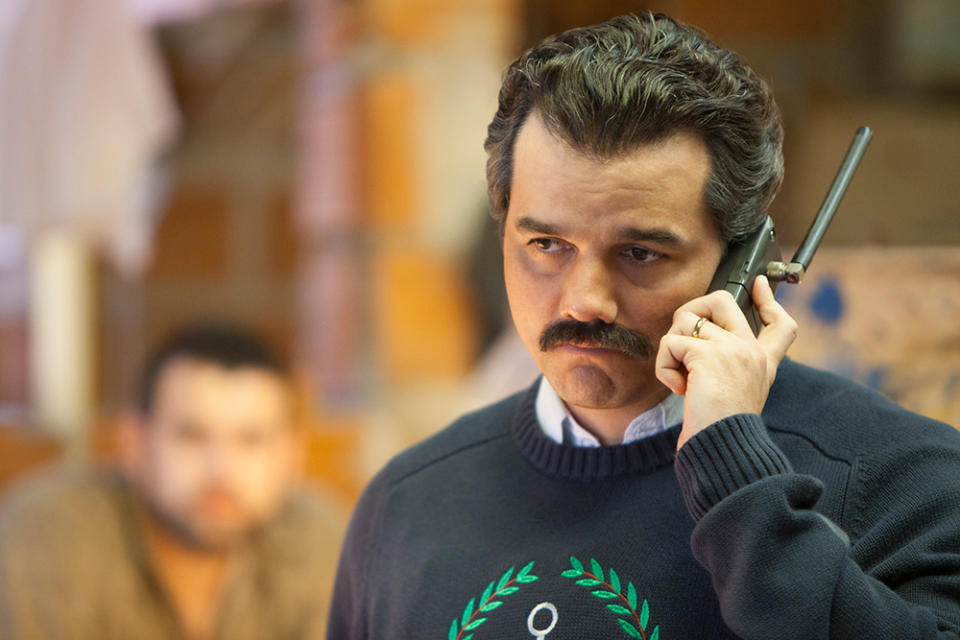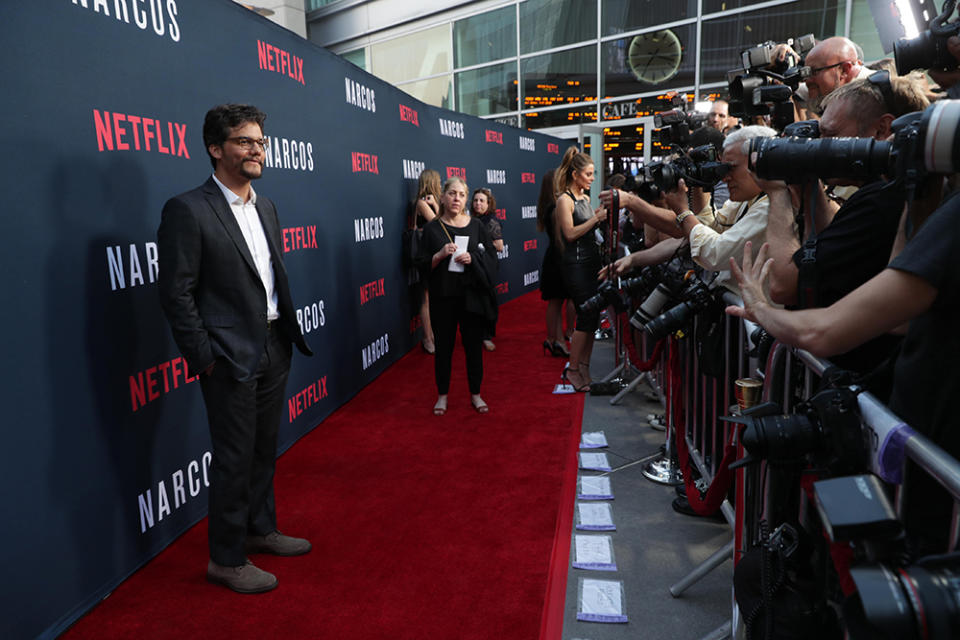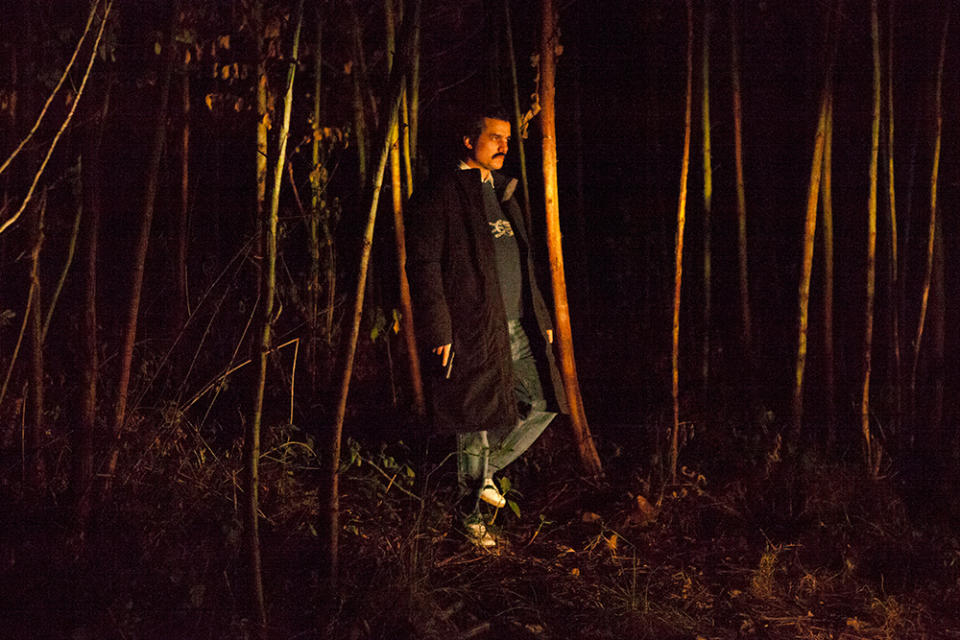Pablo Escobar Was a Horrible Man. But He Was an Interesting Person.

For the mountains of cocaine receiving screen time in the Netflix drama Narcos, one of the few people never shown actually ingesting any of the infamous white powder is the person most often associated with it: Pablo Escobar.
"Pablo never touched cocaine; he liked marijuana," says Wagner Moura, the Brazilian actor who plays the Medellin cartel boss on the Colombian-set period drama. "The fact that he was a pot smoker affects the character, in a way. But at the same time, he was a very grounded man. He never touched cocaine, and he never liked people who did."
Although he did not watch esteemed fictional Hollywood star Vincent Chase's attempt to play Escobar to disastrous consequences on the TV series Entourage-he heard it was just too cartoonish-Moura did his homework reading biographies and studying other film and TV depictions of the legendary crime boss. While he learned Spanish and immersed himself in Colombian culture during production, no one had to teach him how to roll joints.
"I knew it-trust me," he says with a twinkle in his eye.
We are talking in a very posh, very proper, and very deserted sitting area outside the restaurant at the London West Hollywood the week before Narcos' Season Two premiere, which hits Netflix on September 2. Moura's head-to-toe all-black ensemble of ankle boots, slim-legged pants, and a fitted light-weight sweater match the shade of his dark hair and scraggly beard, but the outfit clashes with his pot-bellied on-screen persona who, this season, becomes more emotionally wounded and reactionary before he is-spoiler alert to those without Wikipedia or who didn't see Moura talk about it with Jimmy Kimmel-taken out in a hail of bullets.
[contentlinks align="center" textonly="false" numbered="false" headline="Related Story" customtitles="Watch the 'Narcos' Season Two Trailer" customimages="" content="article.46897"]
"I tried to know as much as I could about Pablo, but I did that in order to create my own version of him," Moura says. "I don't think that actors should imitate [their subjects]. Otherwise, go see a documentary. You have to create your own. It's Pablo, but it's also a mix of Pablo and myself and the way I see him. In the end, I was doing things that he was doing, as well, but there was no rational decision. I learned organically about the way he would walk or the way he would wear his pants. I didn't want to have anyone on the set telling me Pablo wouldn't do this."
I don't think that actors should imitate [their subjects]. Otherwise, go see a documentary.
Even the idea of who actually did in Escobar in is up for debate. Was it members of Los Pepes, the rival group made up of his enemies? Was it an American sniper? Colombia's special ops Search Bloc? In any case, there is the iconic photo of grinning officials hovering over a bloodied corpse in faded jeans and a blue T-shirt like they had just completed an afternoon of successful deer hunting. The image is seen in Narcos' opening credits, and the show even shot its reenactment of that fateful shootout on the same rooftop.
"Narcos is a series where we really try to be as accurate as we can because we have this documentary style [of filming]," Moura says. "We really tried to be as accurate as possible with the Colombian history, but we get to a point where you have to imagine an intimate [conversation]. That has to be something we have to create."
Moura has not been in contact with Escobar's surviving family members, despite the fact that the late drug lord's brother, Roberto, has quite publicly insisted he prefer it otherwise.
"The greatest thing was when he said, 'I'm sure Wagner Moura has no experience running a drug cartel,'" he laughs. "Or, 'I'm sure he has no experience laundering money.' And he's absolutely right."

Regardless of the insinuations that he is not actually a criminal, Moura's devotion to his craft did not go unnoticed by his bosses.
"The challenge of humanizing a monster like Pablo Escobar was something that we felt had hampered previous attempts to realize this story," Narcos executive producer Eric Newman says via email. "It took an actor of Wagner's caliber to pull it off. His commitment to getting inside the characters head, to showing sides of him that went deep, inspired and guided all of us in the making of Narcos. We never wanted to make an exploitation show about a drug dealer. Wagner's performance left little risk of that. I believe he is one of the best actors in the world, and I am honored to have helped introduce him to a global audience."

The hurdles Newman is speaking of include requiring Moura to add excess body weight onto his normally trim frame (something he swore after Season One that he'd never do again-and which he insists again that he means it this time). Toward the end of this season, an ever-growing porcupine of prickly gray and black beard hair was glued to his face as his character went further on the lam. And Moura still continues deal with locals' pushback on his-and much of the rest of the cast's-grasp of Colombian dialect and accents on the series that has both English and Spanish dialogue.
"I tried in the first season; I did the best I could," he says in regards to what many thought was a failed attempt at interpreting Escobar's native tongue. "It's not that I didn't want to please Colombian people; I wanted them to feel that we respected them. But honestly the accent wasn't my main [concern]. It's a series where we have actors from Chile and Brazil and…honestly, it's a bunch of different Spanish accents. I was the main character. I'm Brazilian. I didn't speak Spanish before. And I expected to be the main target of criticism. But it isn't a series that is [just] made for Colombians. Though it tries to be respectful, it's Netflix, so it's seen around the whole world. And I love the fact that it's a bilingual show."
I expected to be the main target of criticism. But it isn't a series that is [just] made for Colombians. Though it tries to be respectful, it's Netflix, so it's seen around the whole world. And I love the fact that it's a bilingual show.
Vernacular is, of course, important to realism. But the vocal online community who took issue with these matters could have also been upset that, once again, outsiders are recognizing their country for its villain instead of a hero. Just hours after this interview ended, news broke that Colombia had declared peace with FARC. The left-wing rebel group had had its own dealings with Escobar and the Medellin cartel.
Moura understands this; after all the build up to the summer Olympics in Rio certainly aired his country's dirty laundry of political corruptness, environmental dangers and more to the rest of the world.
"I'm trying to be active politically, and it's been really hard because the country's polarized," says Moura, who will next be directing a film about Brazilian Marxist guerrilla Carlos Marighella. "We have a press in Brazil that [seems] as if every citizen were informed by Fox News. It's a very dark moment. So the Olympics were just bad timing. But it ended up being better than everyone thought it would be. And this is very Brazil." Yet Moura understands that expecting the unpredictable can also chance one's perspective of the present. "When you think things are going to get worse, we find a way to make it happen," he says. "The impact of the Olympics for the country is something we don't know yet. What's this going to mean to the country?"
For Colombia, he says, "the drug trade is a completely different thing."
"The Colombia you see in Narcos is completely different [than from today]," he says of the series, which is set in the latter part of the past century. "Colombia is now the second biggest economy in South America after Brazil. They reconstructed themselves in 25 years. It was amazing. Bogota is a very cultural, modernized city. For them, it kind of sucks when someone goes, 'Oh Colombia. I know cocaine.' But at the same time, I think that art and film and theater exists to put a mirror in front of yourself, but also in a bigger way in terms of society and history."

Moura had not, however, thought about the implications his series might have on the U.S., given that it's told via the narration of Boyd Holbrook's DEA agent Steve Murphy-one of the people who took down Escobar. Narcos executive producer Jose Padilha recently told journalists that "the role of Mexico is very important to this story" of the drug trade. Is Moura concerned that his series might offer additional ammo for Republican presidential candidate Donald Trump's grand plans to build a wall to keep out alleged murderers and rapists?
"To say the political and social situation in Mexico is caused by the drug trade, like Donald Trump said, is just super unfair," Moura says after pausing to consider the question. "It's about prejudice and racism. This is a country that cannot close itself to the world. I'm not American, but from outside I just see that not only culturally, but also economically, it would be a really bad situation."
Personally, he says, "I think that the war on drugs is a big, big flop, and it's proven that it only exists to kill young people in poor neighborhoods of countries that produce and export drugs. El Chapo is in prison. Escobar is killed. But if you have the demand, you're not going to stop it. I think that drugs should be legalized."
El Chapo is in prison. Escobar is killed. But if you have the demand, you're not going to stop it.
That demand will continue to be seen onscreen as well. Javier Bardem is set to star in a film biopic about Escobar based on Colombian journalist Virginia Vallejo's brilliantly titled tell-all memoir about her romantic relationship with the drug lord, Loving Pablo, Hating Escobar. Moura cannot wait to see Bardem's performance.
"We will always be fascinated by stories of people that live above the law; people that don't respond to the same rules that we do," Moura says. "The old American films of the Old West and Bonnie and Clyde-there's always going to be [an appeal] to see things that we can't do. Pablo was a real character and really did all that crazy shit that he did. He was a mean man. He was a horrible man. But he was an interesting person, we have to give him that. He wasn't satisfied being the seventh richest man in the world. He wanted to be loved. He wanted to be respected. He wanted to be the president of Colombia. How crazy is that?"
Escobar might not have gone down in history the way he wanted. But one way or another, he will always be remembered.
[contentlinks align="center" textonly="false" numbered="false" headline="Related Story" customtitles="El Chapo & the Secret History of the Heroin Crisis" customimages="" content="article.46918"]
You Might Also Like

